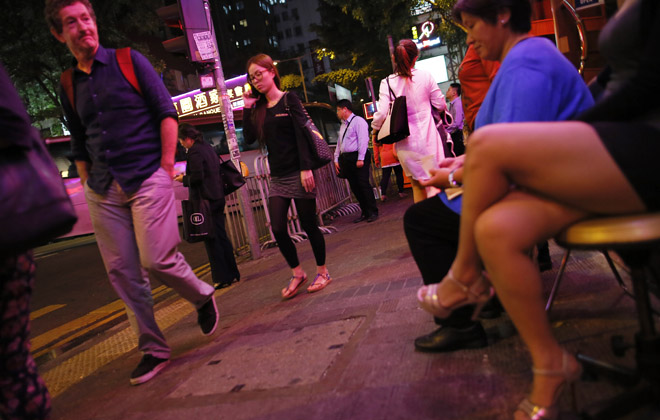Horror hits Hong Kong’s famed red-light district

Bar girls sat outside a night club in Hong Kong's Wan Chai district on Wednesday. (AP Photo/Vincent Yu)
HONG KONG >>For generations of Western men, Hong Kong’s Wan Chai neighborhood captured all the mystery and hedonism of this financial capital known around the world as the Pearl of the Orient.
Prostitutes, strippers and bar girls entertained visiting sailors and businessmen at all hours in these neon-filled blocks, even as working-class Hong Kongers went about their business around them. And despite all the vice, foreigners could count on being able to walk home safely in the wee hours, while many prostitutes worked independently, without protection.
Now, the neighborhood has been jolted by the killings of two young Indonesian women, with a British banker the sole suspect. Even as the music and drinks continue flowing in Wan Chai’s bars, people say the murders have cast a pall on the freewheeling streets.
“If you go with somebody, and you don’t know who they are, that’s what could happen to you,” said Allen Youngblood, an American jazz pianist who has lived in Hong Kong since 1992. “You roll the dice, and you don’t know who’s who.”
Hong Kong police have charged 29-year-old British banker Rurik George Caton Jutting with two counts of murder in the deaths of 29-year-old Seneng Mujiasih and 25-year-old Sumarti Ningsih. Police found the bodies in Jutting’s 31st-floor apartment, Ningsih with stab wounds to the buttock and neck and Mujiasih stuffed into a suitcase left on the balcony, also with cuts to her neck. Police were alerted by Jutting himself, and was waiting for them in his apartment when officers arrived.
On Wednesday, several regulars in a British-themed bar called Old China Hand on Lockhart Road in the heart of the red-light district said they knew Jutting and Mujiasih.
Don't miss out on what's happening!
Stay in touch with breaking news, as it happens, conveniently in your email inbox. It's FREE!
A Filipino bartender, who identified herself only as Lisa, said she remembered Mujiasih approaching strangers in the bar, always ready to chat them up.
“If you didn’t know her, she would come and talk to you,” the bartender said. “She had a lot of jokes. She loved meeting people. It is just a sad thing.”
Youngblood called Jutting a bully who used his bulky body to push his way through crowds and drink from other’s glasses.
“He wanted to get two or three girls at the same time,” he said while sipping a vodka tonic. “He had a lot of money and used it on women. There are a lot of guys around here like that.”
On any given night, scores of foreign men and young, made-up Asian women fill the pubs on Lockhart Road, while outside on the sidewalk, hostesses in cocktail dresses swarm passing Western men, hoping to entice them into booming nightclubs.
That seedy scene long defined Hong Kong to outsiders, even as prostitution became more established in other neighborhoods, said John Carroll, a professor who specializes in the city’s history at the University of Hong Kong.
“When they think of Wan Chai, for a lot of people, they think of Suzie Wong,” he said, referring to the fictional Hong Kong prostitute in a 1957 book about the city’s sex industry. “But there’s much more to Wan Chai.”
The neighborhood on Hong Kong island now includes middle-class apartment towers as well as blocks with some of the highest land prices in the world. Even the red-light district has been transforming, with luxury stores and shopping centers moving in and rents shooting up.
The rent for one storefront on Lockhart Road is about $80,000 a month, said Steve Sayell, a former British policeman who said he met Jutting several times.
Many of those moving in are highly paid professionals working in the city’s finance sector and eager to blow their paychecks in Wan Chai’s bars and nightclubs, Sayell said. For them, spending hundreds of dollars on prostitutes and cocaine is just part of a normal night’s agenda, he said.
“They need a release,” Sayell said. “In the old days, you just drank a lot. Now a lot of people are resorting to recreational drugs.”
For many of the Southeast Asian women working in Wan Chai, stints on the strip help bring in extra income on top of day jobs as maids and nannies, he said. One of the victims, Mujiasih, had overstayed a domestic worker visa, said Sam Aryadi, an official with the Indonesian Consulate in Hong Kong.
About half of the 319,325 migrant domestic workers in Hong Kong are Indonesian and nearly all are women, according to the human rights group Amnesty International.
Mira Septyawaniti, a 36-year-old Indonesian who first came to Hong Kong in 1999 as a domestic worker, said many of her friends were mourning the two victims. She said she got to know Mujiasih in Wan Chai and like her had left her domestic worker job.
“A lot of people are talking about her now,” Septyawaniti said. “We all felt like she was one of us.”
A Zambian prostitute, who only identified herself as Suzie, said she wouldn’t be put off by the murders even though she works in some of the same bars Jutting drank in.
“It’s so sad,” she said. “Have you heard of something like that? But if they try to cut me, I’ll fight back. I’m a fighter.”
Lisa, the bartender, also insisted the murders wouldn’t stop the party in Wan Chai.
“Wan Chai will stay exactly the same,” she said. “People will come here looking for fun, they’ll meet all kinds of different people, and when they’re tired, they’ll go back safely to their homes.”




